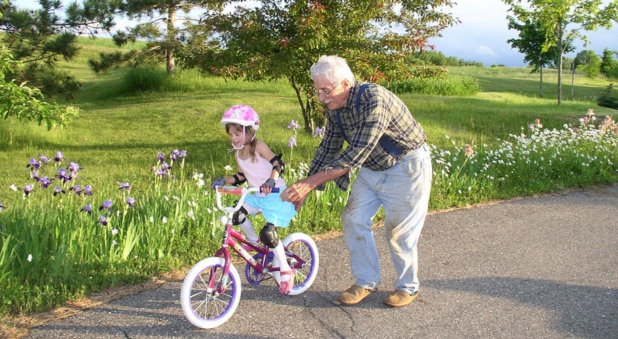Footsteps for Future Generations: The faith legacy grandparents leave (Anglican Press Australia) Edited by Ian Barnett
For many people today, there is a lot of life left after retirement. Many years ago, when I began work, the union representative told me that our superannuation scheme for men was based on retirement at 65 and death at 67½! Now, the life expectancy for men is 81 and 85 for women.
Being a grandparent can now last for 20 or 30 years. Most of us who become grandparents will do so at a time of life when we are still very active.
In 2017, John Chapman published the book Making the Most of the Rest of Your Life, and in it he urged us all to prepare for an eternity beyond this short time on earth – the most important consideration as we grow older. But as life expectancy increases, how will I make the most of the remaining part of this life? And often that question is affected by the demands of modern life upon families.
More and more, grandparents are called upon to have a role in the lives of their children’s children. Every day in our suburb I see older adults pushing children in strollers who are obviously not theirs. My grandparents never pushed my stroller! Grandparents are much more involved in the younger family than in previous years.
So much has changed since I had grandparents, that a book like Footsteps for Future Generations is welcome. To be grandparents who have not “passed their use-by date”, we need to understand what has changed and how it has changed the lives of our grandchildren.
Former Sydney rector the Rev Ian Barnett is the founder and CEO of the National Grandparent Movement, and in this book has brought together 10 essays by nine grandparents who have the wisdom to be able to think theologically about being an intentional Christian grandparent.
The theme is “legacy”. Apart from material things, what will I leave to my grandchildren when I am gone from here – something that lasts beyond this life? Then there is the Biblical imperative. Some of us will not have registered the significant passages that emphasise our responsibility as grandparents. Mike Raiter develops this theme in his essay on how the Bible teaches us to live in retirement and old age.
To start us thinking, Colin Bale provides an overview of grandparenting from 1900 to 2020. Some of us grandparents have lived through a good many of these changes. Yet the changes of the past 50 years – the changes in our society’s worldview – are greater than the changes of the previous 100 years. These more recent changes have been more significant for our grandchildren than change was for us.
Kel Richards’ essay invites us to consider how those changes have affected our grandchildren’s way of thinking and outlook on life, and to reflect on how little we really understand them. But his essay title tells us where he will end with all this: “Prayer and your grandchildren in the light of culture”.
You probably already pray for your grandchildren. Richards invites us to consider what we should be praying for our grandchildren, how much we should be praying for them, and when and how we should be praying with them – the latter a new thought for some of us.
Christine and Peter Jensen reflect together helpfully on what some of these things might look like in our family life, while Keith and Sarah Condie look at how we can equip ourselves for a long period of grandparenting.
Then Jonathan Harris tells the story of his parents and grandparents, concluding with a great anecdote from a tribal leader in Pakistan. Asked what it was about his father that had influenced him most, the leader answered, “He told me about Jesus”. Wishing to probe more deeply, Harris rephrased the question. The answer: “He taught me about Jesus Christ”.
The greatest legacy will be no surprise, but what is needed so that we leave this legacy?
As a Christian since childhood and a grandparent of 23 years, this book left me thinking. It is worth reading, and the issues within it are worth praying for and about. It is also worth our determination to grow yet closer to our Lord Jesus so we will be able to represent Him for them.
Paul Whiting is the associate pastor for seniors at St Mark’s, Pennant Hills, and has five grandchildren.
























